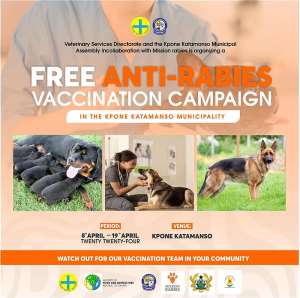
Veterinary Services Directorate of the Ministry of Food and Agriculture, is to provide rabies vaccination for free in the Katamanso Municipality.
Dr Emmanuel Kwao Pecku, the Tema Metropolitan Veterinary Officer, who also doubles as the Kpone-Katamanso Municipal Vet Officer, told the Ghana News Agency (GNA) that his outfit was targeting to vaccinate at least 5,000 of the pets, which translates to about 70 per cent of the animals in the municipality.
Dr Pecku said the free exercise, which would take place between April 8 and 19, 2024, would see officials from the directorate visiting homes to vaccinate the animals and, therefore, appealed to pet owners to make them available for the exercise.
He disclosed that the cost of vaccination was being funded by Mission Rabies, a non-governmental organisation that has been collaborating with the municipal assembly since 2022 to support the veterinary unit with free rabies vaccines, mobile applications, fuel, capacity building for health and veterinary staff on rabies prevention and control, as well as other logistics to enable them.
He said the exercise was a joint programme between his outfit, Mission Rabies, the Kpone-Katamanso Municipal Assembly (KKMA), and the Municipal Health Directorate.
He indicated that this support from the stakeholders would go a long way to eliminate dog-mediated rabies within the municipality, adding that such exercises would help develop an example for successful rabies elimination in the Kpone-Katamanso Municipality and eventually the entire country when it is expanded to other municipalities.
Dr Pecku noted that between 2017 and 2023, the Kpone-Katamanso municipality had 14 confirmed rabies cases in animals, comprising 13 dogs and one cat, while four human deaths from rabies occurred.
He indicated that the statistics showed a surge in both human and animal rabies cases within the area due to most pet owners not vaccinating their pets, the unavailability of human rabies post-exposure vaccines in the health facilities, the large stray dog population, inadequate logistics during vaccination campaigns to move around the communities, and inadequate public education, among others.
He, however, stated that after some intensified awareness creation with the help of the information service unit, the National Commission on Civic Education, the media, and free mass vaccinations of dogs, the number of vaccinated animals has increased, and the confirmed rabies cases have also reduced drastically.
He stated that from February 2022 to June 2023, more than 13,500 dogs and cats were vaccinated against rabies within the municipality.
The vet officer said that rabies is a viral zoonotic disease caused by a neurotropic virus of the family Rhabdoviridae, genus Lyssavirus, a sub-group rabies virus that causes progressive and fatal inflammation of the brain and spinal cord.
He said clinically, rabies has two forms: furious rabies, which is characterised by hyperactivity and hallucinations, and paralytic rabies, which leads to paralysis and coma.
“Rabies affects all warm-blooded animals, and the disease is prevalent mainly in developing countries in Asia and Africa, including Ghana. Rabies remains one of the most important zoonotic diseases, with case fatality rates approaching 100 per cent,” he stated.
He reminded the public that bites from domestic dogs constitute the major mode of rabies transmission and disproportionately affect the poorest communities; therefore, there is a need to cooperate with the vet directorate for the pets to be vaccinated.
GNA




 Chief arrested for killing soldier at Kasoa over land
Chief arrested for killing soldier at Kasoa over land
 GAF probes soldier’s murder at Kasoa Millenium City
GAF probes soldier’s murder at Kasoa Millenium City
 Ghana steps up effort to pass new Labour law
Ghana steps up effort to pass new Labour law
 AG advises EOCO against money laundering probe into Cecilia Abena Dapaah’s affai...
AG advises EOCO against money laundering probe into Cecilia Abena Dapaah’s affai...
 May Day: I'll prioritise welfare of workers, abolish compulsory retirement age a...
May Day: I'll prioritise welfare of workers, abolish compulsory retirement age a...
 V/R: Adaklu-Tevikpo murder suspect arrested from hideout
V/R: Adaklu-Tevikpo murder suspect arrested from hideout
 Kasoa: Soldier killed by alleged land guards over land dispute — GAF
Kasoa: Soldier killed by alleged land guards over land dispute — GAF
 Fatal shooting of soldier happened at Gomoa East not Kasoa; stop tarnishing our ...
Fatal shooting of soldier happened at Gomoa East not Kasoa; stop tarnishing our ...
 ‘We condemn unprovoked attack in no uncertain terms’ — GAF on fatal shooting of ...
‘We condemn unprovoked attack in no uncertain terms’ — GAF on fatal shooting of ...
 Ghanaians urged to ensure violence free elections on December 7
Ghanaians urged to ensure violence free elections on December 7
